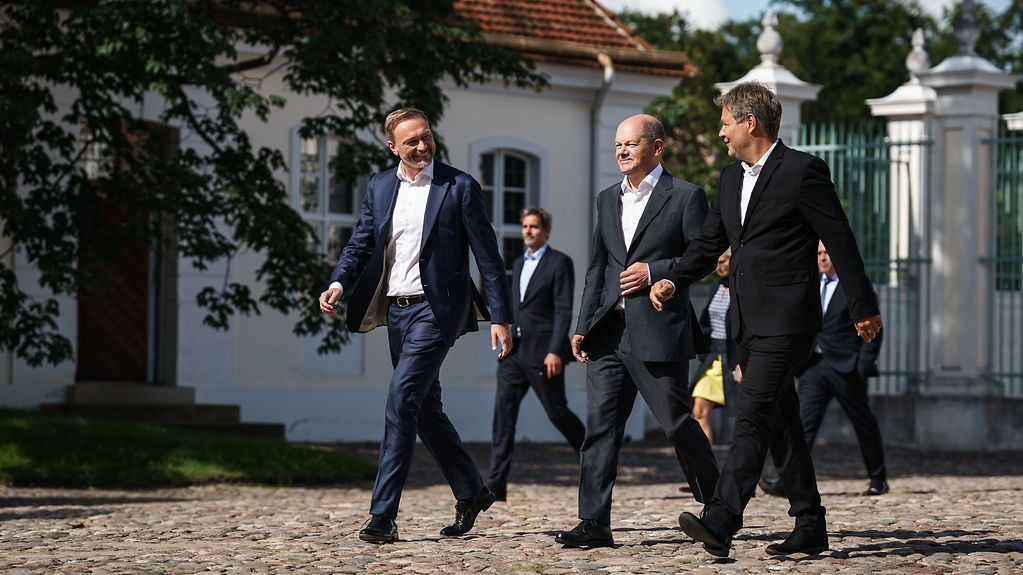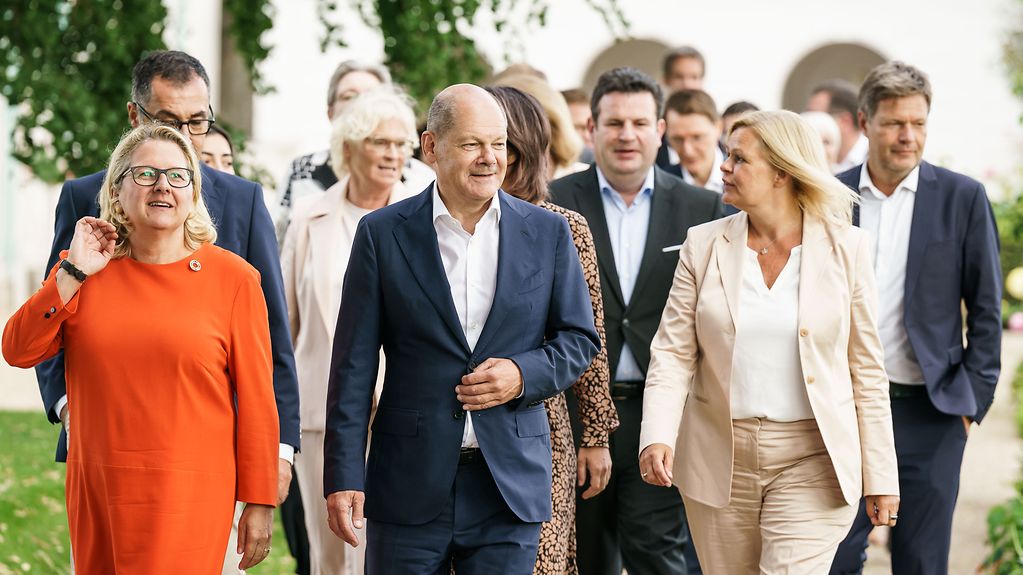Closed meeting of the Federal Government
At its closed meeting in Meseberg, the Federal Government worked intensively and in a spirit of optimism to develop solutions to current challenges – in order to ensure national security as well as a reliable and affordable supply of energy. Federal Chancellor Scholz stressed that these issues were “of the utmost importance for the future of our country”.
5 Min. Lesedauer

Federal Chancellor Scholz, Ministers Habeck and Lindner: in-depth deliberations on security and energy supply.
Foto: Federal Government/Denzel
The security situation, Germany’s energy supply, measures to combat the shortage of skilled workers: the Federal Government met in Schloss Meseberg for a closed meeting to discuss current challenges “that are of the utmost importance for the future of our country”, according to Federal Chancellor Olaf Scholz. At the end of the two-day session, he said the Cabinet had met in a positive, constructive atmosphere and had made the most of the opportunity to get down to work together.
Deliberations on the security situation
Meeting at the Federal Government’s guest facility, Schloss Meseberg, the Cabinet engaged in particularly in-depth deliberations on the subject of the international security situation. The Russian war of aggression against Ukraine was an attempt to shift borders by force, said Federal Chancellor Scholz. “This is why it’s right for ourselves and all our friends and allies to support Ukraine in defending its integrity and sovereignty.”
The change in the global situation had consequences for cooperation in NATO, as well as in terms of its expansion to include Finland and Sweden, said Scholz. The Federal Chancellor said that the special fund of 100 billion euros for the Federal Armed Forces meant “we would be able to do everything necessary to ensure a secure future for our country”. Federal Chancellor Scholz said it was important to prevent authoritarian states from getting away with their political schemes in the world. “This is particularly true of Russia, of course, with its dangerous strategy that is now causing suffering among so many people – not just in Ukraine but all over the world.”
Towards a National Security Strategy
At the meeting in Meseberg, the Federal Government also discussed the National Security Strategy which it intends to develop by the end of the year, and which has taken on a new urgency as a result of the Russian invasion of Ukraine.
Federal Chancellor Scholz said that the protection and security of the country and its citizens was the primary task of any government. “But security involves a lot of things. A reliable supply of energy and raw materials, for example. The preservation of our efficient social market economy. High-quality education and research. A diverse and vibrant democracy,” said the Chancellor. This was why the Federal Government was working on an integrated approach to German security policy that took all aspects into account, he said.
What is the National Security Strategy?
For the first time, the Federal Government intends to present a comprehensive National Security Strategy to replace the Federal Government’s white paper of 2016. It will incorporate NATO and EU input, too: after all, Germany’s security is based on a strong North Atlantic Alliance as well as a unified European Union.
Spanish Prime Minister as a guest
To this end, the Federal Cabinet in Meseberg also exchanged views with the Spanish Prime Minister Pedro Sánchez: the latter was invited to attend the closed cabinet meeting on Tuesday as someone whose country has been actively endeavouring to establish a security strategy of its own. Sánchez talked about his own experience as well as offering his view of key security challenges and Germany’s role in the world. “It was good to talk to a friend and engage in dialogue with the head of government of a country we collaborate closely with,” said Scholz at the press conference after the meeting. Military security was not the only factor here, he said: the issue of how to ensure energy independence was crucial too, for example.
Focus on securing the supply of energy
The issues currently arising in connection with Germany’s energy security were also the focus of talks in Meseberg. “We can say that we were quick to see the threat that might arise from Russia using its fossil exports as a means of influencing the decisions made by other countries,” said the Federal Chancellor. He noted that the Federal Government was putting everything in place to enable Germany to get through the winter in good shape: new liquefied natural gas terminals were being built on the coasts of northern Germany, gas storage facilities were being filled to high levels and coal-fired power plants were being put back into operation.
“Of course we’re well aware that the supply of energy is not the only issue here: the question of prices is vital, too,” said Scholz. The aim would be to develop a precise, individually tailored relief package to help citizens and businesses get through this difficult period in good shape, said the Federal Chancellor, adding that this work would be completed soon.

The Cabinet met at Schloss Meseberg, the Federal Government’s guest house.
Foto: Federal Government/Denzel
Minister of Economic Affairs Habeck: “We have answers”
Federal Minister of Economic Affairs Robert Habeck also pointed out that preparations had started very early on to secure Germany’s energy supply. “Because we started so early, we now have answers and we've made progress that will enable us to go into the winter well prepared,” said Habeck. Gas reserves would be available to the market, he said, while various other measures would be taken to prevent prices from going through the roof.
Finance Minister Lindner: “Robust relief package covering the entire spectrum of society”
Federal Finance Minister Christian Lindner said that the cabinet meeting had focused on overcoming the current crisis as well as on shaping the future. In view of rising energy prices, “a robust package is needed to provide relief across the entire spectrum of society”, said Lindner. At the same time, it was important to get to the root of the problems, he said: the “automatic system of profit generation had to be tackled” so as to reduce uncertainty in the electricity market.
Other topics included vocational training and digitalisation
The Federal Government dealt with other topics in Meseberg that required sufficient time for thorough discussion – such as vocational training. After all, the training market has been particularly affected by the pandemic and by the digital transformation. “This is why we want to do everything in our power to ensure that as many young people as possible are able to pursue vocational training and have the chance to find an apprenticeship that suits them, thereby laying a foundation for their lives,” said Federal Chancellor Scholz.
In addition, the Cabinet approved the Federal Government’s digital strategy in Meseberg: this will aim to help the country unleash its full potential in this area. It comprises the following three fields of action: Networked and Digitally Sovereign Society; Innovative Economy, World of Work, Science and Research; Learning, Digital State.